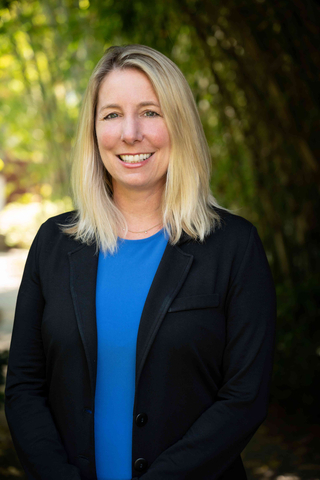City of Hope-developed Chimeric Antigen Receptor (CAR) T Cell Therapy Shows Clinical Activity in Patients With Aggressive Brain Tumors in a Phase 1 Trial
- Half of the enrolled patients had stable disease for at least two months, two showed partial response and two experienced complete response
- Nature Medicine paper highlights delivery of CAR T cell therapy directly to the brain, a technique City of Hope developed
- This is the largest reported trial to date of CAR T therapy for solid tumors

Christine Brown, Ph.D., The Heritage Provider Network Professor in Immunotherapy and deputy director of the T Cell Therapeutics Research Laboratories at City of Hope (Photo: Business Wire)
The study, which is the largest reported trial to date of CAR T therapy for solid tumors, evaluated CAR T cells engineered to target the tumor-associated antigen interleukin-13 receptor alpha 2 (IL13Rα2), a product invented at City of Hope and exclusively licensed by Mustang Bio Inc. (Nasdaq: MBIO), a Fortress Biotech Inc. (Nasdaq: FBIO) Company.
One of the main challenges for treating brain cancer is that medications have difficulty crossing the blood-brain barrier. To overcome that barrier, the trial delivered CAR T cells directly into the brain tumor and the cerebrospinal fluid, the fluid that protects and surrounds the brain and spinal cord.
Twenty-nine of the 58 patients with recurrent high-grade glioma brain tumors, mostly glioblastoma, achieved stable disease after treatment with CAR T cells for at least two months. There were two partial responses, one complete response and a second complete response after additional CAR T cell therapy cycles were delivered under compassionate use. The case was reported in New England Journal of Medicine in 2016.
“Glioblastomas are extremely aggressive tumors that leave patients with very limited treatment options, especially after they have relapsed, but this study shows the potential of CAR T cell therapy in treating brain cancer,” said Christine Brown, Ph.D., The Heritage Provider Network Professor in Immunotherapy and deputy director of the T Cell Therapeutics Research Laboratories at City of Hope, who developed IL13Rα2-targeting CAR T cell therapy. “This study is also the most extensive evaluation of delivering CAR T cells directly to a brain tumor, which we pioneered at City of Hope, and sets the foundation for other studies to utilize this approach.”
Participants, all of whom had relapsed after prior treatment for GBM with surgery, chemotherapy or radiation, or all of these therapies, received intracranial injections of CAR T cells that target IL13Rα2, which is overexpressed in most glioblastomas.
Doses of the therapy were escalated as the trial progressed and all doses tested were well-tolerated. Three routes of administration were evaluated: direct injection to the tumor site, infusion into the cerebrospinal fluid or injection into both areas.
The median overall survival for all patients was eight months. The trial culminated in treating a patient cohort that used an optimized manufacturing process and injected CAR T cells at both the tumor site and into the cerebrospinal fluid. For this final patient cohort, researchers were able to establish a maximal feasible dose and found that these patients had the best median overall survival of 10.2 months, which was higher than the expected survival rate of six months in patients with recurrent glioblastoma.
“These were heavily pretreated patients so we were not sure how they would do with CAR T cell therapy,” said Behnam Badie, M.D., The Heritage Provider Network Professor in Gene Therapy, chief of neurosurgery at City of Hope and the study’s senior author. “But some of them even did better than how they initially responded to standard of care treatments.”
Peter Valadez, 58, of
“One doctor told me to get my affairs in order because I only had a few months to live,” Valadez said. “She also told me to look into receiving CAR T cell therapy at City of Hope. I did, and that is why I am still here today.”
Valadez received the CAR T cell therapy in July 2018 with minimal side effects. He did experience wound-related complications, likely the result of having several surgeries and prior radiation therapy to treat his tumor. The left side of his body is partially paralyzed.
The father of three grown children and a four-year-old granddaughter has not received any other therapies since the CAR T therapy over five and a half years ago.
“I tell Peter that he is here with us to celebrate milestones, to see his kids grow up and, now, to see his grandchild,” said his wife, Josie Valadez. “CAR T saved his life.”
City of Hope, a recognized leader in CAR T cell therapies for glioblastoma and other cancers has treated more than 1,200 patients since its CAR T program started in the late 1990s. The institution continues to have one of the most comprehensive CAR T cell clinical research programs in the world — it currently has about 70 ongoing CAR T clinical trials, which include 13 different solid tumor types. The trials use City of Hope-developed therapies and industry-sponsored products.
In addition to evaluating the safety and feasibility of IL13Rα2 CAR T cells delivered locally for this trial, Brown, Badie and the team also wanted to learn more about which patients might respond best to the therapy. By sampling tumors and cerebrospinal fluid at the delivery sites, they found certain markers that were positively associated with survival and with CAR T cell administration and bioactivity, respectively.
“The idea that you can deliver a therapy and sample the environment at the same time to analyze changes in the brain is very unique and could have a huge impact on the field,” said Badie. “I think people will be adopting these technologies that can help us recognize potential mechanisms of resistance to or failure of therapy.”
The trial results build on more than a decade of collaborative work between Brown, Badie, Stephen J. Forman, M.D., director of the T Cell Therapeutics Research Laboratories, and other City of Hope researchers on IL13Rα2-CAR T cells.
“This was an in-house translation of scientific findings to human trials — a clear example of how you can test a novel therapy in patients, go to the lab to improve it and then return to the clinic with a more effective therapy,” said Badie. “I think that back and forth is really unique to City of Hope and is only possible due to the incredible collaboration between our different teams and the capability City of Hope has to produce the CAR T cells on-site.”
City of Hope, with its clinical, research and production facilities all on one campus, is uniquely positioned to harness the “bench to bedside” resources necessary for the discovery, development, manufacturing, quality assurance, testing and deployment of leading-edge treatments.
Next, the team says that future randomized studies in larger patient cohorts will be needed to confirm and expand their findings related to the critical parameters for successful CAR T therapy.
Brown says they are also excited to start a trial to engineer CAR T cells to be resistant to transforming growth factor-beta, a dominant tumor suppressor, as well as a study to combine different CARs that can target multiple antigens and build new bispecific CARs that could engage two disease targets instead of just one.
“Between the positive outcomes we saw in our Phase 1 study and the new avenues we are exploring, we hope our work can have a dramatic impact on the field of immunotherapy and the lives of cancers patients around the world,” she said.
The study team also included researchers from Translational Genomics Research Institute in
The trial was supported by grants from Gateway for Cancer Research, the Food and Drug Administration, California Institute for Regenerative Medicine (CIRM), CIRM Alpha Stem Cell Clinics Network, National Cancer Institute, and National Institute of Neurological Disorders and Stroke of the National Institutes of Health. In addition, partial funding was provided by Mustang Bio Inc.
Brown, Forman and Badie have financial interests in Mustang. Brown has previously been a paid consultant for Mustang.
About City of Hope
City of Hope's mission is to make hope a reality for all touched by cancer and diabetes. Founded in 1913, City of Hope has grown into one of the largest cancer research and treatment organizations in the
View source version on businesswire.com: https://www.businesswire.com/news/home/20240307463963/en/
Letisia Marquez
626-476-7593
lemarquez@coh.org
Source: City of Hope







